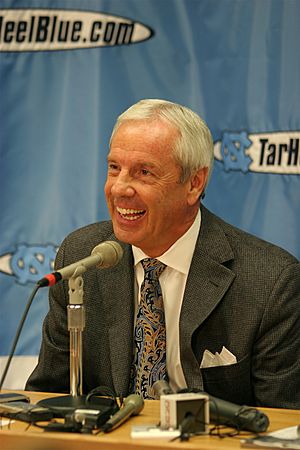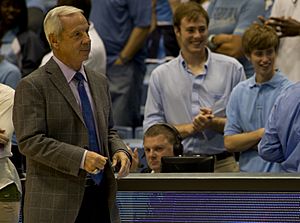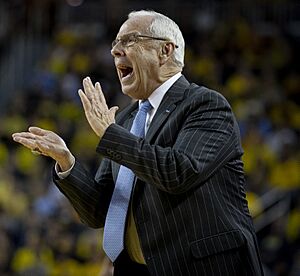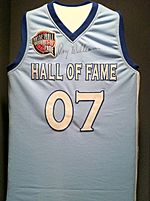Roy Williams (basketball coach) facts for kids

Williams in 2008
|
||||||||||||||||||||||||||
| Biographical details | ||||||||||||||||||||||||||
|---|---|---|---|---|---|---|---|---|---|---|---|---|---|---|---|---|---|---|---|---|---|---|---|---|---|---|
| Born | August 1, 1950 Marion, North Carolina, U.S. |
|||||||||||||||||||||||||
| Alma mater | North Carolina (1972) | |||||||||||||||||||||||||
| Playing career | ||||||||||||||||||||||||||
| 1968–1969 | North Carolina (J.V.) | |||||||||||||||||||||||||
| Coaching career (HC unless noted) | ||||||||||||||||||||||||||
| 1973–1978 | Charles D. Owen HS | |||||||||||||||||||||||||
| 1978–1988 | North Carolina (assistant) | |||||||||||||||||||||||||
| 1988–2003 | Kansas | |||||||||||||||||||||||||
| 2003–2021 | North Carolina | |||||||||||||||||||||||||
| Head coaching record | ||||||||||||||||||||||||||
| Overall | 903–264 (.774) | |||||||||||||||||||||||||
| Tournaments | 79–27 (NCAA Division I) 4–1 (NIT) |
|||||||||||||||||||||||||
| Accomplishments and honors | ||||||||||||||||||||||||||
| Championships | ||||||||||||||||||||||||||
|
||||||||||||||||||||||||||
| Awards | ||||||||||||||||||||||||||
|
||||||||||||||||||||||||||
| Basketball Hall of Fame Inducted in 2007 (profile) |
||||||||||||||||||||||||||
| College Basketball Hall of Fame Inducted in 2006 |
||||||||||||||||||||||||||
|
Medal record
|
||||||||||||||||||||||||||
Roy Allen Williams (born August 1, 1950) is a retired American college basketball coach. He was the head coach for the North Carolina Tar Heels for 18 seasons. Before that, he coached the Kansas Jayhawks for 15 seasons. He is a member of both the College Basketball Hall of Fame (since 2006) and the Basketball Hall of Fame (since 2007).
Williams began his college coaching journey at North Carolina in 1978. He was an assistant coach for the famous Dean Smith. In 1982, North Carolina won the national championship. After ten years, Williams became the head coach at Kansas in 1988. He led Kansas to 14 straight NCAA tournaments and four Final Fours. His teams won nine conference titles.
In 2003, Williams returned to North Carolina, his old school. He took over as head coach of the Tar Heels. During his 18 years at North Carolina, Williams won three national championships. He also reached five Final Fours. His teams finished first in the Atlantic Coast Conference nine times. He won three ACC tournament championships. Williams is second in wins at North Carolina, only behind Dean Smith. On January 25, 2020, he passed Smith's win total with 880 victories.
Williams finished his career with 903 wins. He led his teams to nine Final Fours at Kansas and North Carolina. He is one of only five NCAA Division I men's coaches to reach 900 wins. He reached this milestone faster than any other coach. He is also the only coach to lead two different programs to at least four Final Fours each. He is also the only coach with 400 or more wins at two different NCAA Division I schools.
As an assistant coach, Williams helped North Carolina win the 1982 national championship. As a head coach, he coached in six NCAA championship games. These included games with both Kansas and North Carolina. He won his first national championship on April 4, 2005, with the Tar Heels. They beat the University of Illinois. He won his second title on April 6, 2009, against Michigan State. His third and final national championship came on April 3, 2017, when the Tar Heels beat the Gonzaga Bulldogs. Williams is one of only six NCAA Division I men's coaches to win at least three national championships.
Contents
Early Life and Basketball Beginnings
Williams was born in Marion, North Carolina. He spent his early years in small towns there. His family later moved to Asheville, where he grew up. Williams played both basketball and baseball at T. C. Roberson High School. He was named all-county and all-conference in basketball for two years. He also served as team captain. Williams has said his high school coach, Buddy Baldwin, was a big influence on him.
Williams then played on the freshman team at the University of North Carolina at Chapel Hill. He learned a lot about the game from coach Dean Smith. As a sophomore, Williams would attend Smith's practices. He would sit in the stands and take notes. He also volunteered to keep statistics for home games and worked at Smith's summer camps.
Coaching Journey
Starting Out as a Coach
Williams' first coaching job was in 1973. He coached high school basketball and golf at Charles D. Owen High School in Black Mountain, North Carolina. He coached there for five years.
In 1978, Williams returned to the University of North Carolina. He became an assistant coach for Dean Smith. During his time as an assistant, North Carolina had a great record of 275 wins and 61 losses. They won the NCAA national championship in 1982. This was Smith's first national title. Williams was also very important in recruiting Michael Jordan to play for North Carolina.
Leading the Kansas Jayhawks
In 1988, Williams became the head coach for Kansas basketball. Soon after he started, the team faced a ban from postseason play for the 1988–89 season. This was due to issues that happened before he arrived.
Williams coached Kansas for 15 seasons, from 1988 to 2003. His record there was 418 wins and 101 losses. This is a very high winning percentage. At the time he left, he was second in all-time wins for Kansas. His Kansas teams won nine regular-season conference championships. They also won the Big 12 tournament three times. In the 2001–02 season, Kansas became the only team to go undefeated in Big 12 play. From 1994 to 1998, the Jayhawks won 62 home games in a row. This was the longest streak in the NCAA at the time.
Under Williams, Kansas made it to the NCAA Tournament every year except his first season. They reached four Final Fours. They also played in the national championship game twice, in 1991 and 2003. They lost both of those games. The 1996–97 team had future NBA players like Paul Pierce and Raef LaFrentz.
Williams took the 2003 Kansas team to the NCAA championship game against Syracuse. Syracuse won the game 81–78. On April 13, 2003, Williams announced he was leaving Kansas. He decided to go back to North Carolina to coach. He said it was because of his roots, his dream, his family, and because it was hard to say no to Coach Dean Smith twice.
Returning to North Carolina
Williams became the head coach at North Carolina. He was the school's third coach in six years. The team had struggled a bit before he arrived. But they still had talented players like Sean May, Rashad McCants, and Raymond Felton. In Williams' first season (2003–04), North Carolina finished with a good record of 19 wins and 11 losses. They returned to the national rankings. They lost in the second round of the NCAA tournament.
First National Championship (2005)
In Williams' second year, the Tar Heels became a top team again. With new freshman Marvin Williams, Roy Williams led North Carolina to a National Championship in 2005. This was his first national title as a head coach.
Building a Strong Program
After winning the championship, many top players left the team. But the Tar Heels still did well in 2005–06, thanks to players like freshman Tyler Hansbrough. Williams was named Coach of the Year for his great work with a new team.
Williams quickly brought in more talented players. On December 9, 2006, he won his 500th game. The 2006–07 team won the ACC regular season and tournament championships. They made it to the Elite Eight in the NCAA Tournament. In 2007, Williams shared that he had vertigo, which sometimes made him need to sit down during games.
The 2007–08 season was also very successful. The Tar Heels won another ACC regular season and tournament title. Williams led them to a school-record 36 wins. They were the #1 team in the country. Their run ended with a loss to Kansas, Williams' former team, in the 2008 Final Four.
Second National Championship (2009)
With Tyler Hansbrough back for his senior year, many thought the Tar Heels would win the NCAA championship. They started the season as the #1 team. They won their first 13 games. They secured their third straight ACC regular season title. North Carolina earned the top seed in the NCAA South Region. They made it to the Final Four in Detroit. They beat Villanova to reach the national championship game. They played the Michigan State Spartans and Williams won his second title with an 89–72 victory. The Tar Heels were very dominant in this tournament. They only trailed for 10 minutes in total. They won every game by at least 12 points.
Later Seasons and Milestones
In 2010, an academic issue that started before Williams' time was discovered at the University of North Carolina. This involved some athletes and students. The Tar Heels had a tough season in 2009–10, finishing with a losing record in conference play. It was the only time in Williams' coaching career his team didn't make the NCAA tournament when they could have. They played in the NIT championship game but lost. Williams called it the "biggest frustration" of his professional life.
The 2010–11 season started slowly. But after a change in the starting lineup, the Tar Heels started winning more. They won the ACC Regular Season Championship. Williams was named ACC Coach of the Year. They made it to the Elite Eight in the NCAA Tournament.
The 2011–12 season was successful despite many injuries to key players. The Tar Heels won another ACC Regular Season Championship. They were the #1 seed in their NCAA Tournament bracket. However, injuries to important players like Kendall Marshall hurt their chances. They lost to Kansas in the Elite Eight.
In the 2012–13 season, Williams earned his 700th career coaching victory. The Tar Heels made it to the second round of the NCAA tournament. The 2013–14 season also ended in the second round of the NCAA Tournament.
The 2014–15 season saw the Tar Heels reach the Sweet Sixteen.
During the 2015–16 season, Williams led the Tar Heels to their fourth Final Four under his coaching. They also won the regular season and ACC tournament titles. In the 2016 NCAA tournament, North Carolina reached the national championship game. They lost a very close game to Villanova on a last-second shot.
Third National Championship (2017)
Williams led his Tar Heels to their second straight ACC regular season championship. On January 16, 2017, Williams won his 800th game as a head coach. Justin Jackson was named ACC Player of the Year. In the 2017 NCAA Tournament, North Carolina won its third national title in the Roy Williams era. They beat Gonzaga in the championship game.
In 2018, UNC lost in the second round of the NCAA Tournament.
The 2018–19 season was another strong one for North Carolina. They tied for first place in the ACC. They swept their rivals Duke and North Carolina State. Williams was named the USA TODAY Sports National Coach of the Year. The Tar Heels made it to the Sweet Sixteen of the NCAA tournament.
On November 27, 2019, Williams tied Adolph Rupp for 5th in all-time wins. On January 25, 2020, he passed Dean Smith to become fourth on the NCAA's all-time Division I coaching wins list.
The 2019–20 season was challenging for North Carolina, ending with a losing record. This was Williams' first losing season as a college head coach.
On February 27, 2021, Williams won his 900th game. He became the fastest men’s coach to reach this milestone in Division I history. On March 11, 2021, he won his 903rd game, passing Bobby Knight for third on the all-time Division I wins list.
The Tar Heels lost in the first round of the NCAA tournament in 2021. This was the first time Williams had lost in this round as a head coach.
On April 1, 2021, Williams announced his retirement after 48 years as a coach. He coached for 33 years as a head coach. His total record was 903 wins and 264 losses. He had 418 wins at Kansas and 485 wins at North Carolina. He was replaced by his assistant coach, Hubert Davis.
Personal Life
Roy Williams is married to Wanda. They have a son, Scott, and a daughter. Their son, Scott, played basketball at North Carolina.
In 2009, Williams' autobiography, Hard Work: A Life On and Off the Court, was published. In the book, he talks about his life and coaching career.
Williams had surgery in September 2012 to remove a tumor from his right kidney.
In March 2021, Roy and Wanda Williams donated $3 million to the University of North Carolina. They also donated $600,000 during the COVID-19 pandemic to help student-athletes.
After retiring, Roy and Wanda Williams moved to their home in Flat Rock, Henderson County, North Carolina.
Awards and Recognition
- Big Eight Coach of the Year (1990, 1992, 1995, 1996)
- Henry Iba Award (1990, 2006)
- Associated Press Coach of the Year (1992, 2006)
- Naismith College Coach of the Year (1997)
- Big 12 Coach of the Year (1997, 2002, 2003)
- John R. Wooden Legends of Coaching Award (2003)
- ACC Coach of the Year (2006, 2011)
- Elected to the Basketball Hall of Fame in 2007.
- Named America's Best College Basketball Coach by Forbes in 2009.
- Named Coach of the Decade for the 2000s by Sporting News.
- USA Today National Coach of the Year (2019)
Coaching Record Summary
| Season | Team | Overall | Conference | Standing | Postseason | ||||
|---|---|---|---|---|---|---|---|---|---|
| Kansas Jayhawks (Big Eight Conference) (1988–1996) | |||||||||
| 1988–89 | Kansas | 19–12 | 6–8 | 6th | |||||
| 1989–90 | Kansas | 30–5 | 11–3 | T–2nd | NCAA Division I Round of 32 | ||||
| 1990–91 | Kansas | 27–8 | 10–4 | T–1st | NCAA Division I Runner-Up | ||||
| 1991–92 | Kansas | 27–5 | 11–3 | 1st | NCAA Division I Round of 32 | ||||
| 1992–93 | Kansas | 29–7 | 11–3 | 1st | NCAA Division I Final Four | ||||
| 1993–94 | Kansas | 27–8 | 9–5 | 3rd | NCAA Division I Sweet 16 | ||||
| 1994–95 | Kansas | 25–6 | 11–3 | 1st | NCAA Division I Sweet 16 | ||||
| 1995–96 | Kansas | 29–5 | 12–2 | 1st | NCAA Division I Elite Eight | ||||
| Kansas Jayhawks (Big 12 Conference) (1996–2003) | |||||||||
| 1996–97 | Kansas | 34–2 | 15–1 | 1st | NCAA Division I Sweet 16 | ||||
| 1997–98 | Kansas | 35–4 | 15–1 | 1st | NCAA Division I Round of 32 | ||||
| 1998–99 | Kansas | 23–10 | 11–5 | T–2nd | NCAA Division I Round of 32 | ||||
| 1999–00 | Kansas | 24–10 | 11–5 | 5th | NCAA Division I Round of 32 | ||||
| 2000–01 | Kansas | 26–7 | 12–4 | T–2nd | NCAA Division I Sweet 16 | ||||
| 2001–02 | Kansas | 33–4 | 16–0 | 1st | NCAA Division I Final Four | ||||
| 2002–03 | Kansas | 30–8 | 14–2 | 1st | NCAA Division I Runner-Up | ||||
| Kansas: | 418–101 (.805) | 175–49 (.781) | |||||||
| North Carolina Tar Heels (Atlantic Coast Conference) (2003–2021) | |||||||||
| 2003–04 | North Carolina | 19–11 | 8–8 | 6th | NCAA Division I Round of 32 | ||||
| 2004–05 | North Carolina | 33–4 | 14–2 | 1st | NCAA Division I Champion | ||||
| 2005–06 | North Carolina | 23–8 | 12–4 | 2nd | NCAA Division I Round of 32 | ||||
| 2006–07 | North Carolina | 31–7 | 11–5 | T–1st | NCAA Division I Elite Eight | ||||
| 2007–08 | North Carolina | 36–3 | 14–2 | 1st | NCAA Division I Final Four | ||||
| 2008–09 | North Carolina | 34–4 | 13–3 | 1st | NCAA Division I Champion | ||||
| 2009–10 | North Carolina | 20–17 | 5–11 | T–9th | NIT Runner-Up | ||||
| 2010–11 | North Carolina | 29–8 | 14–2 | 1st | NCAA Division I Elite Eight | ||||
| 2011–12 | North Carolina | 32–6 | 14–2 | 1st | NCAA Division I Elite Eight | ||||
| 2012–13 | North Carolina | 25–11 | 12–6 | 3rd | NCAA Division I Round of 32 | ||||
| 2013–14 | North Carolina | 24–10 | 13–5 | T–3rd | NCAA Division I Round of 32 | ||||
| 2014–15 | North Carolina | 26–12 | 11–7 | 5th | NCAA Division I Sweet 16 | ||||
| 2015–16 | North Carolina | 33–7 | 14–4 | 1st | NCAA Division I Runner-Up | ||||
| 2016–17 | North Carolina | 33–7 | 14–4 | 1st | NCAA Division I Champion | ||||
| 2017–18 | North Carolina | 26–11 | 11–7 | T–3rd | NCAA Division I Round of 32 | ||||
| 2018–19 | North Carolina | 29–7 | 16–2 | T–1st | NCAA Division I Sweet 16 | ||||
| 2019–20 | North Carolina | 14–19 | 6–14 | T–13th | No postseason held | ||||
| 2020–21 | North Carolina | 18–11 | 10–6 | T–5th | NCAA Division I Round of 64 | ||||
| North Carolina: | 485–163 (.748) | 212–94 (.693) | |||||||
| Total: | 903–264 (.774) | ||||||||
|
National champion Conference regular season champion Conference tournament champion |
|||||||||
Coaching Tree
Many former players and assistant coaches who worked with Roy Williams later became coaches themselves. Here are some of them:
- Jeff Boschee: Missouri Southern (2014–2022), Pittsburg State (2022–present)
- Hubert Davis: North Carolina (2021–present)
- Matt Doherty: Notre Dame (1999–2000), North Carolina (2000–2003), Florida Atlantic (2005–2006), SMU (2006–2012)
- Neil Dougherty: TCU (2002–2008)
- Blake Flickner: Dallas Baptist (2006–present)
- Jerry Green: Oregon (1992–1997), Tennessee (1997–2001)
- Jerod Haase: UAB (2012–2016), Stanford (2016–2024)*
- C.B. McGrath: UNC Wilmington (2017–2020)*
- Ben Miller: UNC Pembroke (2008–2019)
- Wes Miller: UNC Greensboro (2011–2021), Cincinnati (2021–present)
- Steve Robinson: Tulsa (1995–1997), Florida State (1997–2002)
- Kevin Stallings: Illinois State (1993-1999), Vanderbilt (1999–2016), Pittsburgh (2016–2018)
- Mark Turgeon: Jacksonville State (1998–2000), Wichita State (2000–2007), Texas A&M (2007–2011), Maryland (2011–2021)*
- Jacque Vaughn: Orlando Magic (2012–2015), Brooklyn Nets (2016–2024)
- Rex Walters: Florida Atlantic (2006–2008), San Francisco (2008–2016)
(*) indicates a former player who also served as an assistant coach to Williams.
More Information
On December 8, 2021, a part of Interstate 40 in North Carolina was named "Roy Williams Highway" to honor him.
- List of college men's basketball career coaching wins leaders
- List of NCAA Division I Men's Final Four appearances by coach
See also
 In Spanish: Roy Williams para niños
In Spanish: Roy Williams para niños




